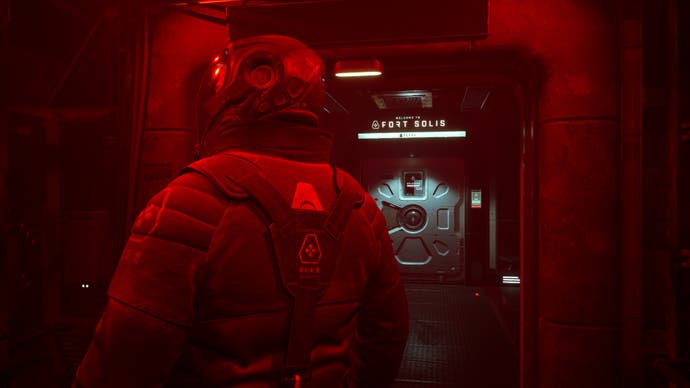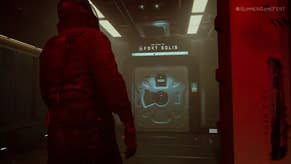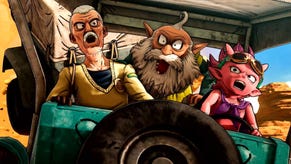Fort Solis review - tense sci-fi spooks give way to a muddled ending
They think it's all rover.
If there's one thing that Fort Solis understands, it's that the worst horrors are not supernatural: they are man-made. Combine this idea with the unforgiving environment of space, and you have the perfect setup for a classic sci-fi tale. Set on Mars in the year 2080, Fort Solis sees you play as Jack Leary - an employee of a large mining corporation called Terra - who is called away from his engineering work to investigate an unusual manual alarm at a neighbouring base. Naturally, this occurs just as some massive Martian storms are due to hit, ensuring you won't have any assistance from the outside world for quite some time. It's a great premise, and Fort Solis initially builds up some wonderful tension as Jack starts poking around the eerily-quiet facility. As things get more serious in the later stages, however, things begin to unravel - both in terms of the story beats, and the slightly messy way the game delivers them.
Fort Solis has the feel of a Netflix show to it: perhaps one that pops up as an alternative when you search for The Last of Us, or gets suggested as an 87 per cent match because you watched all six seasons of Black Mirror. It's very much aspiring to be prestige telly. Split into four chapters, it can be played in one sitting, with a single playthrough taking the same length of time as a TV miniseries. It takes around four to five hours to complete, which is welcome news for anyone with actual responsibilities who needs something that can be finished in a couple of evenings. The art direction, too, aims to create the feeling of an expensive show. Slow camera movements and choreographed action sequences help to sell the idea of this being a gritty, grounded sci-fi tale. The weightiness of Jack's movements remind you that he is very much mortal, and very much on his own. One early sequence sees you climb a cliff face to enter the fort, with a quick-time event based around using Jack's body weight to swing backwards and forwards on a wire until he can reach a ledge. When this nearly goes horribly wrong, it's a nervy reminder that outside is just as dangerous as inside - and nobody is going to come to your aid should you fall.
Continuing the Netflix theme, Fort Solis also boasts some star quality in the form of its cast, with Troy Baker, Roger Clark and Julia Brown voicing the story's main characters. More than anything else, it's the dialogue between these characters that helps to sell the story, particularly in the game's early stages. Here, Jack and Jessica's playful banter over comms allows for some vital character exploration and wider context about their lives on Mars. And, more importantly, someone to bounce off when disturbing things start happening inside the fort.
Due to the game's simple mechanics, the voice acting does much of the heavy lifting in Fort Solis, providing entertaining commentary to fill the gaps when walking between rooms or down lengthy corridors. The gameplay itself mostly involves exploring the base to find audio logs, video logs and emails to build up a picture of what might have happened. Not all the items you interact with link directly to the plot, however, and Jack seems to spend a significant amount of time messing around despite the uneasy situation. Stopping for a beer? Check. Using the gym's stair climber machine? Check. Sitting on a bed discussing good old times, despite having walked past a pool of blood? Also check. Tonally, this can sometimes be quite jarring, particularly considering Jack and Jessica self-awarely discuss the poor choices made by characters in horror films. Their decisions often feel unrealistic and in service of the overall plot - or simply to entertain the player - rather than something believable that an actual human would do.
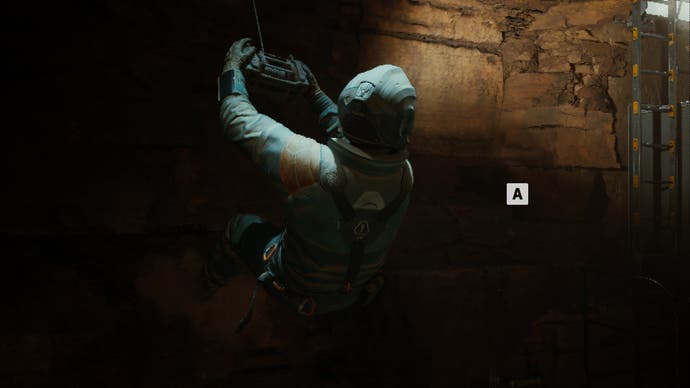
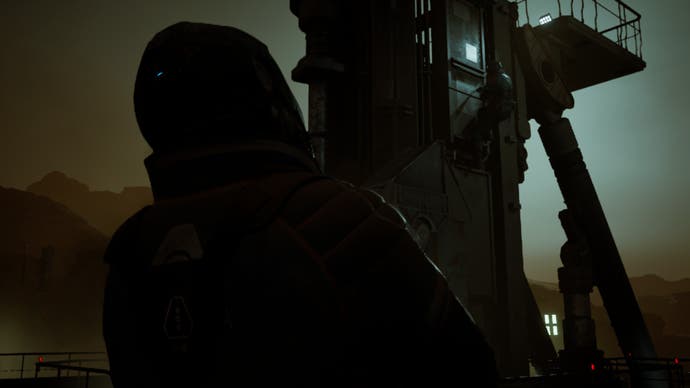
Anyway, there's a deliberate order to your progression through the fort, with access to various sections of the base locked off until you have a higher-level key card. As some of the base is found below ground and some above, using your map to navigate and puzzle-solve your way between the levels forms a core component of the gameplay. Unfortunately, Fort Solis does suffer from the curse of tiny text that seems to plague many modern-day games, and it can sometimes be a struggle to read the pixelated text on your map. I'm sorry to say that in the year 2080, you will still need your reading glasses.
In-between the investigations there are action sequences, which take the form of on-the-rails cutscenes with standard quick-time event mechanics. These aren't radically different to anything you would expect to find in other games, but they do convey a real sense of physicality. One of the most effective and panic-inducing sequences sees you crawl through a claustrophobic vent just as the oxygen supplies start running out. Another highlight takes the form of a confrontation between two characters, where you can see the cogs turning in each person's head as they try to figure the other one out. It's a fantastic moment of psychological tension and terror.
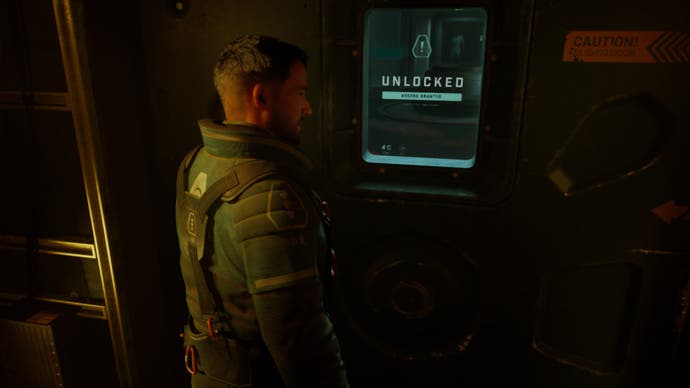
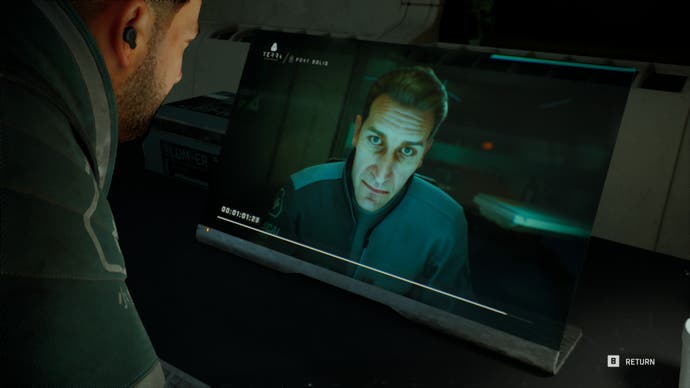
The turning point comes around the mid-way mark, however, where due to 'narrative reasons' the frequency of the chatter on the radio decreases, revealing some of the game's weaknesses. The clunkiness of your walk speed, which was so useful in creating a sense of realism in the early stages, becomes tedious when you're having to retraverse the base for a second or third time. This is particularly irritating when you get lost, which can happen all too easily: Fort Solis isn't the most helpful when it comes to pointing you towards your goals, with a location marker that isn't always reliable, and dialogue cues that can send you in the wrong direction. (What can I say? If someone tells me I can find answers in the greenhouse, I am going to the greenhouse.) Without having someone on the radio to discuss plot developments with, interacting with items suddenly becomes a lot less interesting, and you become aware that Fort Solis' mechanics alone aren't sufficient to sustain interest. There's no other way to put it - the game becomes dull.
With its minimalist approach to game design, Fort Solis relies heavily on its story, but things eventually become disappointing in this department too. Having finished the game and poked my way through most of its interactable items, I'm still not exactly sure what happened inside the base, and I'm yet to understand the logic behind certain characters' decisions. I did, in fact, play through it a second time to see if I could pick up on some extra details, but I remain thoroughly perplexed. A lot of ideas are thrown around in Fort Solis, but never properly brought together. Much of the critical information in the final stages is revealed through jargon-filled scientific documents, and the game would have benefited from a moment where these technical docs were properly explained. (Please, Fallen Leaf, help me out here - I studied arts at uni.) The mystery of what actually happened at the fort is pushed to the very end of the game, where its conclusion then feels rushed. I did manage to build up a vague picture of events, and from my understanding of it, the overarching story is actually fairly straightforward. There are no truly unexpected twists and turns in the later stages, or any genuinely surprising revelations about the characters. When I arrived at the ending, though, my confusion over the details of the story diminished the emotional impact of the final scene. My final reaction was less one of devastation, but more: "Oh… that's a shame".
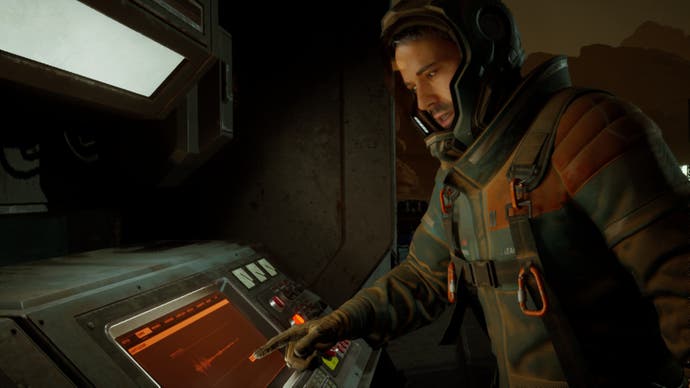
There are two endings to the story, and I reached the more negative conclusion without really knowing what I'd done to get there. Was it because I had failed a couple of the QTEs in the final moments, or had I missed some important evidence at the base? As the rest of the game is very generous with QTE failures (and completely linear with no obvious decision-making moments), this felt odd. The answer, it turns out, lies in the QTEs: if you miss a couple of the very pacey ones in the final scene, you end up with the 'bad' ending. Mercifully, it's possible to reload the game from a save point just before this scene if you want to try again. This still soured my initial playthrough, however, as after several hours of trudging through the base to investigate items, it felt like all my work had come down to a couple of timing errors in the final moments. It felt more like an illusion of choice had been tacked onto the end, rather than threaded into the earlier stages to produce a more meaningful outcome.
So while Fort Solis gets off to a strong start with opening chapters full of suspense and tension, it's unable to maintain this momentum in its later stages. The quality of the voice acting can only take it so far, as its minimalist mechanics, hard-to-read map and slow walking eventually cause frustration. Fort Solis may look like a prestige drama, but without a strong narrative to back it up, the resemblance is only surface-level. The way the story is told in the later chapters feels hazy and imprecise, with an overarching storyline that somehow feels both simplistic and confusing at the same time. With lots of details that don't add up and a rushed conclusion, you may find yourself finishing Fort Solis with more questions than answers.
